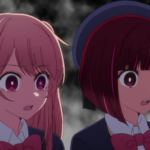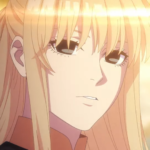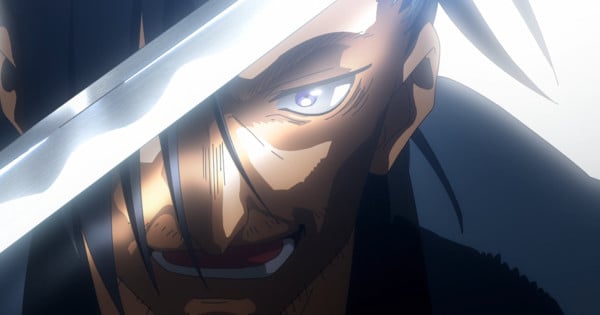How would you rate episode 4 of
Sengoku Youko ?
Community score: 4.1
© 水上悟志/マッグガーデン・戦国妖狐アニメ化事業部
If there’s one thing Mizukami protagonists love doing, it’s playing the villain. Not necessarily being the villain but affecting the mannerisms and positions of traditional bad guys—either to manipulate how others view them or just for the thrill of getting to play the heel and maybe wear a cool, black cape to complete the look. Ironically, it’s usually the characters of his who don’t see themselves as the bad guy are the real antagonists—fueled by self-righteous certainty or too consumed by obsession to realize that creating an army of zombie soldiers or wiping out entire planets might not be the most morally conscious choice.
Jinka sits smackdab between those two options at the moment. At first blush he seems like the same kind of goofy edgelord as Yuuhi from Lucifer & the Biscuit Hammer, constantly asserting his hatred for humanity even as he repeatedly saves them and lets two of them stay at his house. Yet he totally lacks the jaded, self-aware outlook that made Yuuhi‘s misanthropy such an obvious put-on. Jinka genuinely loathes humans as a rule, barely tolerating his new companions and begrudgingly following Tama’s lead thanks to a pact we’ve yet to learn the details of. He’s not playing up his hatred for the sake of intimidation or being a tsundere for humanity. He truly thinks people are defined by their worst instincts and moments of weakness. So it’s fitting that this episode shows him that humans are neither as heartless or helpless as he imagines them.
The first moment that shows this is when the pair encounter the boy who blames them for his mother being sacrificed. While Tama sternly rebuts with the kid, Jinka sees it as confirmation that humans are ultimately selfish—despite basically being in the exact same situation. Just like that villager, Jinka has directed all of his grief and anger at an easy target—because lashing out is emotionally simpler than processing the cruelty of the larger world that led to this hurt in the first place.
Just as Jinka and Tama aren’t at fault for preventing something they didn’t know about, the entirety of humankind isn’t responsible for the war that killed our protagonist’s monster family. Jinka’s not self-aware enough to make that connection, but when the kid offers himself up in return for his mother’s life, the selfless act hits so close to home that it short circuits our edgelord foxboy’s whole system. Much as he might loathe his own humanity, Jinka can’t help but see himself in that kid—to sympathize with his fear of loss—and that really gets in the way of his ruthless avenger shtick. It’s a reminder that Jinka’s misanthropy is still a human reaction and no amount of spiritual power is going to free him from it.
Unfortunately, any progress that mini-epiphany might have triggered is set back when we meet Zanzou Raidou, another man playing the villain for his own reasons, who helps reinforce Jinka’s worst habits. You’d think getting totally schooled by a regular human—magic sword notwithstanding—would perhaps give Jinka pause about the whole Katawara Supremacy thing but his pride’s far too wounded to think about that. Zanzou himself is actually a pretty likable personality, affable and kind of goofy when he’s not being an assassin. His philosophy of eating the Katawara he kills (or selling the meat to others) is an interesting wrinkle—plus he does have a point about how the spirits don’t show any compunctions about human flesh. He’s practically a walking affront to Jinka’s entire worldview, which makes the defeat all the more humiliating—leaving the boy flailing for a way to assert his supposed superiority rather than being grateful to still be alive.
That motivation is what makes their rematch so interesting. While the Dangaisyuu rope in some blackmail material by hinting at Jinka’s human family, the real reason he comes back for round two is that he refuses to believe a human could best him. He’s angry and in denial—but also desperate enough to abandon his typical fighting style in hopes of getting an edge. While Tama is worried about Jinka dying, he’s solely concerned with winning and only manages it by resorting to an impulsive suicide attack that both fighters barely survive. Yet that doesn’t snap Jinka out of his pride-overdose—it merely ends his crisis of faith and leaves him gloating. Even him sparing Zanzou is an act of rubbing it in, rather than mercy. Winning saved his life but it’s only made him less willing to examine himself.
Perhaps it’s strange to have the episode end with Jinka mostly back in the same place as before but the journey there is genuinely compelling. By pushing our hero so far out of his comfort zone, we really start to see what makes Jinka tick, even if he’s too stubborn to make the same observation. It lays bare all of his psychological defenses and leaves Jinka a much more rounded character than he was even after his flashback in episode three. Even if he hasn’t nudged much in either direction, his paths to both heroism and villainy are much clearer—and no less fraught with peril.
Rating:
Sengoku Youko is currently streaming on
Crunchyroll.






